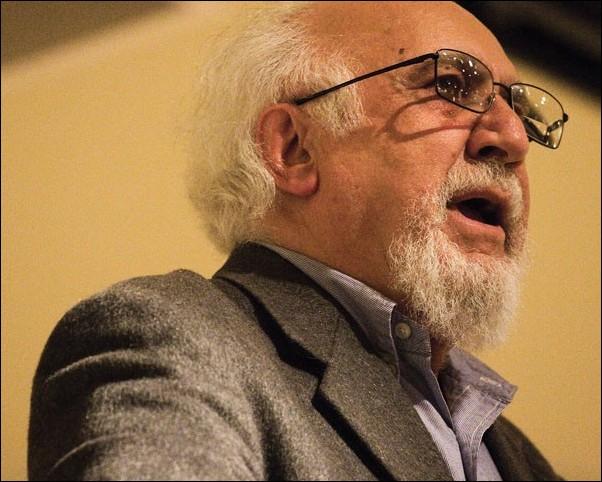High Tech Center caters to disabled
Image: High Tech Center caters to disabled:Mansour Farhang, a former Sacramento State professor and Iran’s first ambassador to the United Nations gives a speech Thursday on democracy in the Middle East.Photo by Nicholas AveyState Hornet:
January 5, 2007
With the help of the Sacramento State High Tech Center, Mark Springer has his textbooks converted to text files and uses software to listen to the text as he reads along.
Springer, an English literature graduate student, was diagnosed with attention deficit disorder, but he went through his entire undergraduate and half of his graduate career without knowing. He said he had a difficult time as a student, he wasn’t doing well in his classes and was falling behind.
“I never would have been able to catch up in my work without their help,” Springer said.
The support came after he was referred to the High Tech Center. Between the help he was getting at the center and working with the equipment and technology available, he was able to catch up with his work.
As a part of Disability Day, the High Tech Center had an open house on Tuesday, which showcased the computer technology used to help students like Springer who have physical or learning disabilities study and do work for their classes.
The center receives 60 to 100 new students each semester, High Tech Center Coordinator and instructor Melissa Repa said, and for many new students this is the first time they have ever used adaptive programs or used a computer period.
Some computers in the center are equipped with adaptive programs such as: JAWS, a screen reading program that allows students who are blind or have low vision to use a computer, and ZoomText, a text- enlarging program and Kurzweil, which scans and reads text to help people with learning disabilities.
Located on the second floor of the Academic Information Resource Center, the High Tech Center provides training and support in the use of adaptive technology, Repa said.
“We give students with disabilities access to computers,” Repa said. The center offers a variety of programs that allow students with disabilities to operate a computer independently.
By using the program Kurzweil, Springer said has been able to complete his reading assignments faster and with far better comprehension of the required material.
Springer said he really appreciates the help he gets at the center and is always raving to the supervisors about what a great job they are doing.
As a graduate student, Springer has to cover a wide variety of English literature that ranges from 750 A.D. to the present, he said. At the end of the semester, Springer has to take a five-hour comprehensive exam where he has to show he has a full understanding of the text.
Alternative media specialists are also available to help students with converting text books, the process of transforming word documents and maps into braille, or converting textbooks and other documents into text files, so students can use text-reading programs such as Kurzweil.
Some computers are set up with the voice recognition program Dragon Naturally Speaking, which allows the user to control the computer without a mouse or keyboard, said Trevor Lorenz, the center information technology consultant.
“Anything you can do with a keyboard and mouse, you can do with your voice,” Lorenz said. “It’s pretty much limitless.”
Along with software, the center also provides naturally shaped keyboards, adjustable computer tables and trackballs to assist students who suffer from carpal tunnel syndrome or other physical disabilities.
Students are first referred to the center from the Students with Disability Office and are then given an assessment of their technological needs, including a list of what has worked and hasn’t worked for the students, Repa said.
The center provides individual and class-sized training which can take a few months or several semesters until a student can become comfortable using a computer.
The center moved to the resource center at the end of February from room 136 of the Library. Before the training classes began, the offices and the computer lab were all in one room. Now, it is in the resource center there is much easier access to each station and the workers can work more closely with the students, Repa said.
“The space is a lot better to provide the training and support to students,” Repa said. Springer said he could always count on the center. “There is no way I could have gone through this English experience without their help,” Springer said.
For more information on the High Tech Center and the equipment and programs available, visit their Web site at www.csus.edu/sswd/services/htc.html.
Matthew Beltran can be reached at [email protected]





























































































































